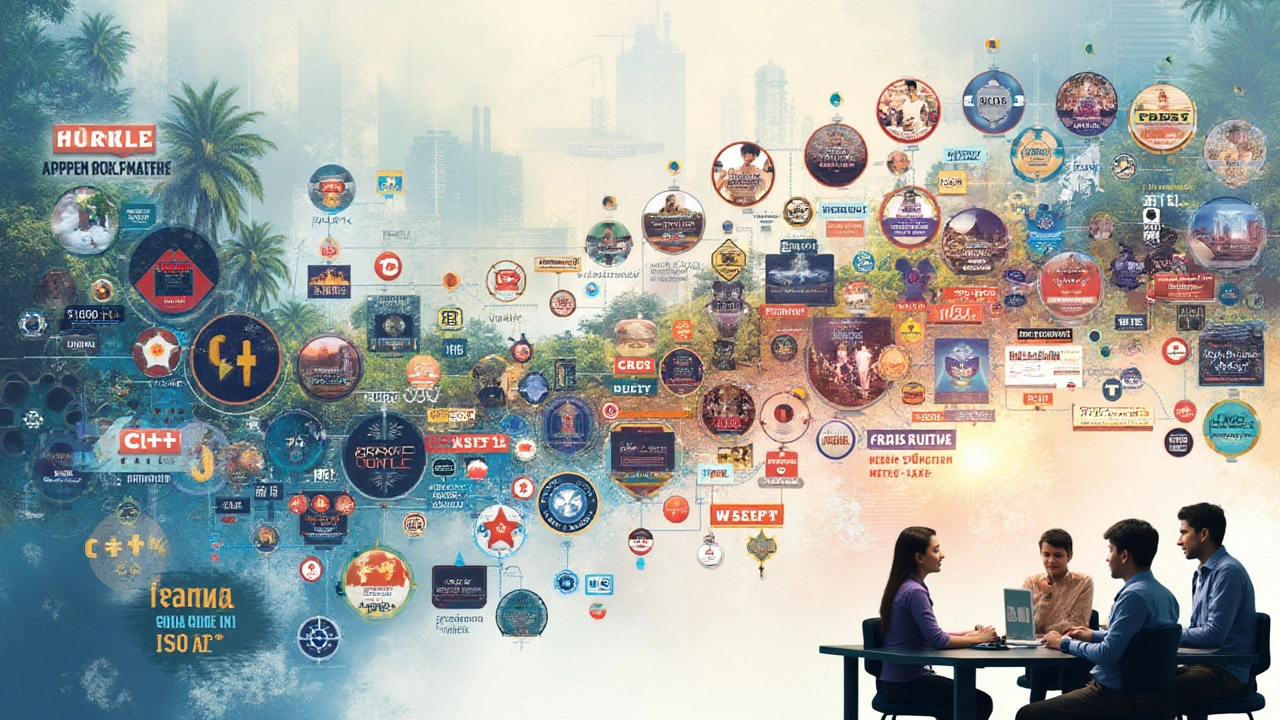Jan
17

- by Dhruv Ainsley
- 0 Comments
If you're setting out on the exciting journey of learning to code in 2025, the first big question is, 'Which programming language should I tackle first?' With countless options, this decision might feel overwhelming, but selecting the right language can significantly impact your programming path.
In this article, we'll explore what various programming languages have to offer and how they align with different career aspirations. Delving into how technological trends are shaping learning choices, you'll also find practical tips for getting started and connecting with communities that can support your growth. Whether you're aiming for web development, data science, or another tech field, let's uncover the secrets to selecting the best language to begin your coding adventure.
- Understanding Programming Languages
- Aligning Your Career Goals
- Practicing and Finding Community Support
- Staying Updated with Trends
Understanding Programming Languages
Diving into the realm of coding begins with grasping the nuances of different programming languages. Imagine each language as a toolbox, tailored for specific tasks. A hammer may not be ideal to screw in a nail, and similarly, the language you choose should align with what you aim to build. For instance, Python is celebrated for its simplicity and efficiency, making it a top choice for beginners. It's heavily utilized in data science, machine learning, and automation, offering a gentle learning curve for those new to programming.
Another popular language is JavaScript, often dubbed the language of the web. If you're looking to create dynamic, interactive websites or enter the realm of front-end development, JavaScript is an essential skill. It's versatile and powers a significant portion of internet content. Meanwhile, C++ offers another avenue, praised for its performance in software development, gaming, and real-time applications. This language requires more intricate understanding, but mastering it builds a robust foundation in programming principles.
Languages like Java provide structure and portability, which is why it's predominantly used in Android app development and enterprise solutions. The ability to write once and run anywhere makes Java a reliable choice for those looking to write broadly applicable code. PHP still holds a steady position due to its role in server-side web development, particularly with content management systems such as WordPress.
"The art of writing code is deciding which tradeoffs are acceptable. A language is just a means to an end, a way of working with tradeoffs." - Paul Graham
In choosing a starting point, it's beneficial to assess the ecosystem each language inhabits. Communities like GitHub and Stack Overflow often reflect the vibrancy and support available for learners. Python, for instance, boasts a vast library and community support, ensuring a steady stream of resources for problem-solving.
Looking forward, emerging technologies might influence the prominence of certain languages. Front-end frameworks or the rise of technologies like blockchain and artificial intelligence can steer learners toward languages tailored for these fields. Understanding these dynamics helps aspiring coders make informed choices that align with future technological landscapes. Exploring different programming paradigms opens doors to new approaches and problem-solving tactics essential for a coder's toolkit.

Aligning Your Career Goals
When venturing into the world of coding, one of the pivotal decisions involves aligning your learning path with your career aspirations. The programming language you start with can significantly shape your future, so it's crucial to consider where you envision your career heading. Different languages cater to different industries and roles, thus understanding their implications can guide you toward the right path. For example, if you're passionate about developing interactive websites, diving into HTML, CSS, and JavaScript is essential. These languages form the backbone of web development, enabling you to bring creative ideas to life in the digital realm. JavaScript, in particular, holds a special place in the web development landscape because of its versatility and ability to enhance user interfaces seamlessly. In fact, a survey recently revealed that nearly 70% of respondents cited JavaScript as the most popular programming language used worldwide.
On the other hand, if data fascinates you and you're inclined toward analyzing vast datasets, Python is the language that holds the key. Known for its simplicity and extensive libraries, Python has become the lingua franca for data scientists. Libraries such as Pandas, NumPy, and Matplotlib make it immensely powerful for tasks ranging from data cleaning to advanced data visualizations. Moreover, as stated by a leading data analytics company, Python's user base has grown by over 20% each year, making it a valuable skill to have. Companies across the globe are increasingly seeking professionals who can harness Python for insights that drive decision-making.
"Choosing the right programming language is like picking the right tool for a job. It must fit not just the task at hand, but also your future plans." – Code Academy Expert
Certain industries have language preferences driven by needs unique to their operations. For those eyeing careers in finance and fintech, languages like R and SQL are critical. They're optimized for statistical analysis and database management, which are standard practices in these fields. Moreover, as fintech innovations continue to surge, the demand for professionals proficient in these languages is simultaneously rising. People involved in health technology may find proficiency in Java crucial due to its use in building scalable healthcare applications that need high reliability. Java’s cross-platform capabilities ensure that such applications can easily operate on different types of hardware and systems, further enhancing its appeal.
The Importance of Industry Trends
Aligning your coding journey with industry trends is also vital. Keeping a finger on the pulse of technology trends can help you anticipate future demands. For instance, the rise of AI and machine learning has amplified the need for experts in languages like Python. Meanwhile, the advent of blockchain technology opens doors for those versed in Solidity. By staying updated, you can better position yourself in a market that continually evolves to embrace new innovations. In essence, whether you aim to delve into the realms of cyber security, which might lead you to languages like C and C++, or mobile app development with Swift and Kotlin, being informed about current trends ensures that your learning efforts align seamlessly with your career goals.

Practicing and Finding Community Support
One of the most transformational aspects of learning to code today is the vibrant communities that surround almost every programming language. These communities provide not just guidance but ensure you're not walking the path alone. From online forums to organized meetups, the opportunities for connecting with other coding enthusiasts are expanding. Engaging with a community can introduce you to new programming approaches, inspire you with different career stories, and even help troubleshoot those stubborn bugs that pop up out of nowhere. Consider joining Stack Overflow, where questions are discussed across thousands of threads daily, offering insights from programmers around the globe. Coders often share that reading through others' questions and answers can be as enlightening as coding itself, highlighting quirks or shortcuts one might not easily find in textbooks.
Once you dive into a new programming language, consistent practice is crucial. But how do you keep yourself motivated over time? This is where incentive-based platforms like Codecademy or freeCodeCamp come into play. They offer structured learning paths and projects to nudge you into habitual practice. As you level up through exercises and projects, the platforms reward your progress with badges and certificates. Balancing structured lessons with creative projects is key, as projects allow you to cement your understanding through application, finding nuances in the code as you go along. Mixing practice with real-world projects can take one's learning to a whole new height. Building a simple website or creating an app isn't just fun but also an excellent way of expanding one's portfolio, which may prove invaluable when job hunting.
Finding the right community is a game-changer. Many learners swear by platforms like GitHub, where they contribute to open-source projects, learning hand in hand with seasoned developers. “Connecting with communities as I was learning to code opened immense horizons for me,” said Linus Torvalds, the creator of Linux. That's the power of coding communities—they provide encouragement, offer a helping hand, and often help form lifelong professional and personal connections. Participation in online workshops and webinars also keeps you updated with the latest trends and tools. For those who prefer a more personal touch, local meetups and hackathons are great places to network, develop new skills, or just have a good time experimenting alongside others who share the same zeal for technology.
The journey doesn't stop at finding the community; it's essential to maintain active participation. Regular contributions in community discussions not only sharpen your skills but also help others. As you gain confidence, platforms like Reddit’s various programming subreddits become useful resources, and answering queries there can further deepen your understanding. Mentoring beginners in the journey you once started is greatly rewarding and helps consolidate the knowledge you’ve gathered. Whether interacting online or in person, having a support network makes the process more enriching and dramatically enhances the learning experience. The bonds you form, the projects you collaborate on, and the knowledge you share creates a dynamic learning environment that's progressive and constantly evolving.

Staying Updated with Trends
In the fast-paced world of technology, catching up with trends isn't just a matter of staying informed; it's essential for anyone aspiring to make a mark in the field of coding. As 2025 unfolds, numerous changes are dictating the direction of software development. With the evolution of technology happening at such a rapid pace, being aware of these shifts helps coders choose which skills to refine and what new opportunities to explore. Consider the rise of artificial intelligence; learning to work alongside these tools can make you significantly more marketable. Additionally, the surge of remote work technologies is also influencing which languages are in demand.
It's not just about the latest technological advancements; trends can also reflect shifts in industry preferences. Blockchain, for instance, has steadily grown in importance across various sectors, prompting a need for developers with specialized skills in particular languages. Keeping an eye on industry reports and discussions can offer insights into which languages are gaining traction. According to a report from Stack Overflow, Python continues to ascend as a favored choice among developers due to its versatility and ease of use.
Staying engaged with the coding community also plays a vital role in keeping up with trends. Platforms such as GitHub, Reddit, and developer forums are treasure troves of information where budding coders can learn from peers and industry veterans. Participating actively not only helps in gathering the latest scoop but also in building a network that encourages knowledge sharing. As one developer noted in a Hacker News discussion, "Technology is not just about keeping pace but also about anticipating and preparing for the new."
Subscribing to tech newsletters, podcasts, and blogs are effective ways to regularly receive curated updates on industry changes. Institutions like MIT Tech Review and Code Academy often publish insightful resources that dive deep into current and future prospects of programming languages. On a daily basis, these are great resources to peruse during a coffee break, ensuring you stay informed without feeling overwhelmed by the abundance of information available. Learning platforms that frequently update their curriculum in response to trends also enable you to gain hands-on experience with cutting-edge technologies.
On the statistical front, a Glassdoor survey conducted in 2024 highlighted how knowledge in newly popular languages such as Rust and Kotlin is correlating with higher earning potential among programmers. Such data points not only validate the importance of remaining updated but also provide motivation to constantly evolve one’s skill set. Furthermore, exploring the landscape of open-source projects can be eye-opening; it offers the chance to participate in the latest implementations of trending technologies, analyze real-world code, and contribute to groundbreaking developments that shape the future.
Ultimately, staying updated with industry trends allows developers to craft a career path that is both adaptive and resilient. It ensures you are not left in the dust as the technological tides shift. In the broad array of options, continuously assessing where the wind is blowing can inform whether it's time to dig deeper into existing knowledge or to embark on learning new technologies. It's this proactive approach that transforms a coder into a valuable asset, ready to tackle the demands that the ever-changing tech world throws their way.





